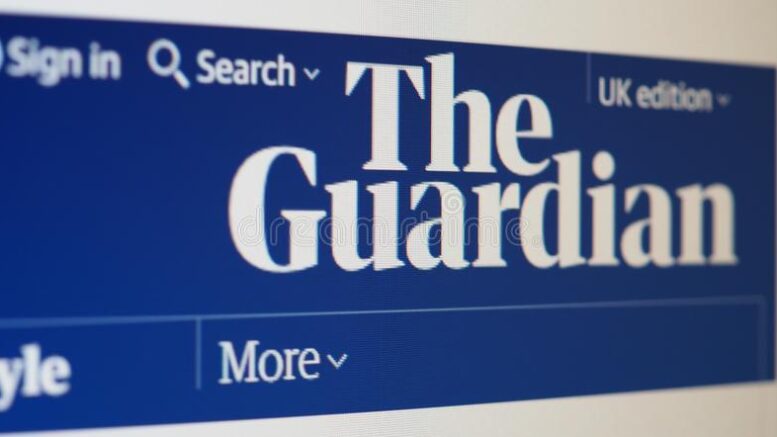I used to admire the Guardian. I liked the way that it covered stories that other papers did not. I liked immensely the work of its once excellent Picture Desk which ran a group of photographers who acted like and turned out photographic work similar to the photographers I had grown up admiring. It was once a paper that asked the awkward questions about our society and provided a valuable and necessary counter voice in a media landscape that in that time is much more narrow and with less sources of alternative information than the media environment is today.
But that was back then. Fast forward to today and the Guardian is not what it once was. I can’t imagine buying the Guardian today to be astonished by great images and entertained by good writing or to be informed of national and international news in articles crafted by reporters who knew their subjects. I still use the Guardian as source material for my writing, because I believe that it is wrong to live in a viewpoint echo chamber and that sources should include outlets I don’t agree with in general as well as those I do. However, I find that I cannot rely on it to be as factual as it once was. The spin on stories in the Guardian has always been there, as with all media, but now the spin in Guardian stories is more like a tornado.
Now the Guardian is a mess. It’s become the house organ for the middle class Left, the megaphone for the public sector managerial classes and a slavish promoter of causes trendy with this class cohort, causes such as transgenderism. Maybe that would not be so bad if the paper gave adequate time and space for writers who disagreed with this particular cause. But, as Professor Kathleen Stock, said in a brilliant article over at Unherd, the Guardian refused to publish stories that were critical of the trans movement. Professor Stock also tells of experienced writers who tried to alert the editorial management about the problems with the child transitioning group Mermaids but who were brushed off. The concerns about Mermaids by experienced journalists were ignored by Guardian editorial management in favour of gushing puff pieces about how wonderful child gender transition was.
Here’s one sample of Professor Stock’s article on the downfall of the Guardian.
When you look at the state of some ostensibly progressive media organisations these days, it’s hard to understand how their more talented employees find the energy to get up in the morning. Imagine starting your career inspired by visions of Woodward and Bernstein and Pulitzer Prizes, and ending up having to capitulate to a rapist’s preferred pronouns.
I can really relate to this. Whilst most people who go into media with high flying ideas end up being disappointed by the mundane practicality of news reporting, what has happened at the Guardian seems particularly bad. What reading Professor Stock’s article tells me is that The Guardian isn’t just following the demands of its audience, as for example the Sun and the Daily Mail do, in order to maximise revenue, it’s editorial staff appear to be coerced into writing and submitting stories that are only positive to the trans cause.
Professor Stock said that various trans groups had visited the Guardian and met with senior editorial management and in these meetings these groups, one of which had connections to Mermaids, dictated how stories relating to the issue of trans were to be reported. This meant that stories that were critical of the cult of trans or which asked awkward questions about the conflict between trans rights and women’s rights were effectively censored by the paper. This put those writers on the Guardian staff who disagreed with gender ideology in a very difficult position. On the subject of the treatment by the Guardian of Hadley Freeman one of the Guardian’s long standing writers and a critic of the gender identity ideology, after the Guardian had thrown their lot in with the trans ideologues Professor Stock said:
From then on, her viewpoint was dismissed by colleagues as “mean”. Editors would repeatedly refuse pitches from her about Mermaids or J.K. Rowling on the flimsiest of excuses, while continuing to publish gushing pieces about child transition. At one point, she said, senior management told her that only journalists with relevant specialities, who also happened to be male, could write about the politics of gender. Books by gender-critical authors were uniformly passed over for review, and only a single interview with one such author made it onto the page (that is, with me — albeit in the education and not the main section, and with a lot of anxiety on the part of the section editor as I recall). Meanwhile, as befits a good and obedient Stonewall Diversity Champion, trans memoir after memoir was puffed in the paper, approved mantras were intoned, and stories of wrong bodies and wrongthink abounded.
While I recognise that all media outlets will have an editorial ‘line’ that they follow, what appears to have happened at the Guardian is worse than that. When it comes to the issue of gender ideology and how stories about it are treated by the Guardian, any thoughts of balance in stories about these matters or even the pretence of balance has been completely chucked out.
This is not a situation that in my view will do the Guardian any favours in the future. The paper refused stories that were critical of the Mermaids group but as we’ve seen in various other outlets and in discussions online, there is genuinely a lot to be critical about with Mermaids. There has been rising concern about how Mermaids plays its part in driving a coach and horses through concepts such as Safeguarding and there is a depressingly long line of individuals who have been erroneously classified as ‘trans’ whilst very young by hospitals working to guidelines promoted by Mermaids and groups like them.
The Guardian could, ironically, have had the scoop of the decade if they had allowed writers like Hadley Freeman to investigate Mermaids and similar groups. A thoroughgoing journalistic investigation into the promoters of child gender transition might have had a massive impact on the debate, especially if it had been undertaken by skilled, experienced reporters from a paper with a once great reputation. A Guardian writer who busted the spell that the cult of trans groups like Mermaids have had over the media and government might have done the morally and journalistically correct thing by subjecting the ideas of the trans movement to public debate. Such an investigation that might have saved hundreds of British children from the physical and mental life changing effects of gender ‘woo’ and forced the advocates of the gender cult to prove their assertions. Such a story or series of stories might have even elevated the paper and its staff into genuine ‘Woodward and Bernstein’ territory and made the Guardian a paper that was admired today as it once was yesterday.
Unfortunately that is not the route that Guardian editorial management decided to take. Instead they cleaved to the cult of trans and treated as Holy Writ the dangerous and fact light pronouncements of the promoters of gender ideology. By doing so the Guardian management took a once great newspaper and sold its soul to a cult in order to be able to virtue signal their ‘niceness’. They had the story of the decade under their noses but ignored it because trans groups basically told them to do so. If the Guardian survives in its present form then maybe future media historians will point to the Guardian’s embrace of the cult of trans with the same level of criticism that is today reserved for those Western journalists who in the 1920’s and 1930’s became apologists and mouthpieces for Joseph Stalin.
The Guardian really could and should have done better than it has when it comes to the issue of the cult of trans. The fact that the Guardian, a paper that once gave a necessary platform for dissident voices, did not should make us both sad and somewhat angry.






Your views are as usual very well presented and hard to disagree with. I have for years subscribed to my newspapers online e editions and must confess that I was really shocked when I recently noticed the price of a printed copy. The cost of a paper has gone up beyond believe in real terms and I wonder if this industry has a future in the age of the internet and the cost of living crisis.
Thank you for your compliment. A printed newspaper has become for me a bit of a treat, something I do when I push the boat out such when I have a Wetherspoons fried breakfast. I definitely could not afford to have a paper every day like I used to. Yes the print media does have problems but what worries me is that the internet unlike newspapers and newspaper libraries are not geared up for information longevity. It’s relatively easy to find information about X story from a cuttings file but less easy to find out about some stories on the web.
As well as being cheap enough to afford every day online e editions also remove the need to take my aging bones to the shop in vile weather every morning as well. Not an ideal medium to store news as you say but nothing’s perfect ( you and I excepted of course).
Thanks Fahrenheit for that insight, I gave up newspapers up years ago some times it can be bad for your health & pocket.
Here is more madness from the Alphabet people & what is happening to their mental health.
https://pjmedia.com/news-and-politics/benbartee/2022/12/08/the-experts-finally-discover-why-lgbtq-youth-are-suicidal-n1651913
Oh, that’s indeed wonderful!